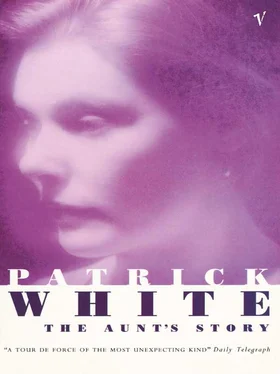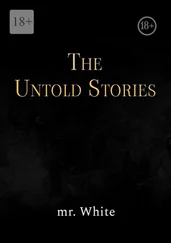‘Theodora,’ Mrs Goodman said, ‘has grown thin and yellow.’
‘Yes,’ said Theodora, ‘it has been a trying summer.’
The hills were burnt yellow. Thin yellow scurf lay on the black skin of the hills, which had worn into black pockmarks where the eruptions had taken place. And now the trees were more than ever like white bones. Out of all this exhaustion formed the clear expectant weather of autumn, smelling of chrysanthemums and first frost. Theodora filled the house with the gold chrysanthemums. Their stalks snapped and ran strong sap in her hands.
Father sat against the windowful of pines, with a plaid across his shoulders for the cold that had not yet arrived.
‘Theodora,’ he said, ‘in the end I never saw Greece, because your mother would not come. She said it was a primitive country, full of bugs and damp sheets and dysentery. So we went to Vienna.’
Father’s voice complaining was the voice of an old man, and, of course, because Father was old, his beard was white. Even so, it had just happened.
‘I have been nowhere,’ Theodora said.
She bent and kissed him. She was kissing, she felt, not Father, but an old man. An old man complaining in a Greek play. And she felt sad. She was sad for Meroã. Because it was coming to an end. The play would finish, after the blaze of gold.
Soon, in fact, the house was full of the smell of dead chrysanthemums, which are more than dead flowers, they are the smell of death. Only statues can resist the smell of dead chrysanthemums.
So that when Theodora woke in the night she heard that it was happening. Her heart was cold. Heavy skeins of smoke fell from the lit candle. The folds of her nightgown fell from her like folds of falling wax, from which her hair streamed. She was walking in the passages of Meroã, a reflection walking through mirrors, towards the door which had always been more mirror than door, and at which she was now afraid to look.
Inside the room, of which the windows were open, Father lay on the couch. He was close, closer than her own thought, and at the same time distant, like someone in a public house. This was also George Goodman, a decent cove, educated, but weak and lazy, said the men in the street outside the Hotel Imperial.
Now this George Goodman looked at her a little bit puzzled. But her own close thought spoke to her from his mouth and said, ‘I am glad that you have come, Theodora. I thought that you would. Because I know I am going to die.’
She streamed out beside him on the carpet, kneeling, touching his knees. Her breath was hoarse. ‘No,’ she said. ‘Not yet, Father. No’
His voice was as pale as the grey light that now sucked and whispered at the pines.
‘But there is no reason, my dear Theodora, why I should go on living. I have finished.’
‘No,’ she said, ‘not yet.’
She would throw her strength against this stone that he kept rolling on her mouth.
‘And we are close,’ he said. ‘It is not possible for us to come any closer.’
But it was for this that she buried her face in his knees. Time spread out before his almost extinguished voice, a great shiny metal funnel on which her hands slipped.
‘In the end,’ his voice said, out of the pines, ‘I did not see it.’
Then Theodora, with her face upon his knees, realized that she was touching the body of George Goodman, grazier, who had died that morning.
She walked out through the passages, through the sleep of other people. She was thin as grey light, as if she had just died. She would not wake the others. It was still too terrible to tell, too private an experience. As if she were to go into the room and say: Mother, I am dead, I am dead, Meroã has crumbled. So she went outside where the grey light was as thin as water and Meroã had in fact, dissolved. Cocks were crowing the legend of day, but only the legend. Meroã was grey water, grey ash. Then Theodora Goodman cried.
MY dear Violet,
I am filled with remorse when I think that it is many months since I received your kind letter, but you will forgive me, I hope, knowing that so much has happened. Since we moved from Meroã to Sydney, we have been fitting ourselves into a whole new life, and it has not been altogether easy. If it were only myself, it would be a different matter but Mother is set in her ways and finds it difficult to adapt herself.
However, I must not let our dull existence detract from your good news. I was interested and delighted to hear that you had married Charlie Simpson, who, if I remember, was excellent in a waltz. Violet, I hope you will be happy. Of course you will . While we are still on the subject of marriages, I must tell you that Fanny married Frank Parrott quietly, from the Parrotts’ house, just before Mother and I moved here. It was agreed that there was no reason why any sadness should postpone the wedding, and Fanny herself was anxious to avoid coming here for a month or two before returning to Frank and Sorrel Vale, so the event took place. Fanny was disappointed, to be sure, that it was not the smart function with bridesmaids for which she had hoped, and for which she had planned the dresses, but now she is happy in her new house, on one of the small farms adjoining Mr Parrott’s, which a tenant had vacated at an opportune moment. Of course this is only temporary. Frank is looking about him. He is anxious to go in for sheep.
As for ourselves, we are living in a medium house above the bay. How to describe it I don’t know, for it is not a very distinguished house, thin and red, one of a row. There is a garden in the front and a garden at the back, thin gardens, but places in which to breathe the air, and from upstairs we have a view across the bay, which is full of delightful dancing boats. We brought with us enough furniture to furnish our smaller house. The rest we sold with Meroã.
This, Violet, was terrible. May you never experience a sale in your own house. Mr Parrott and Frank were very kind, all through, helping with the business of settling our affairs, which would have been terrifying otherwise, for my father, poor darling, was careless. However, we have enough to live on, Mother and I, in comfort. I do not want to tell you much about the end of Meroã. Enough to say the land was bought by Mr Parrott, all except the home paddock and the house, which went for a summer place to a Mr MacKenzie, who married that Una Russell from Spofforths’. Mr MacKenzie is a common sort of man with a great deal of money that he made out of beer. I did not see Una, and confess that I was glad. I could not have borne her face peering into private corners, and her bangles jangling at Meroã.
Now you almost have my story. Can you see my life? It is so mild as to be easily imaginable. At first I thought I could not live anywhere but at Meroã, and that Meroã was my bones and breath, but now I begin to suspect that any place is habitable, depending, of course, on the unimportance of one’s life.
Now I must leave you, Violet. Mother is calling for her tea. Naturally she has been distressed by the loss of so many of her possessions, but I do not doubt that time and quiet will restore her.
Again I thank you for your kindness in our troubles, and send you my sincere wishes for your own happiness.
Theodora Goodman
‘Where have you been, Theodora?’ asked Mrs Goodman.
‘I was writing a letter to Violet Adams,’ Theodora said.
‘Violet Adams? A flat, pale girl. I remember. Outside the church. I always thought her rather an insipid friend.’
‘No doubt Violet is all that you say,’ Theodora said. ‘But it appears that she is also kind.’
‘Oh, kindness ,’ said Mrs Goodman’s voice trailing into a piece of bread and butter.
Читать дальше












